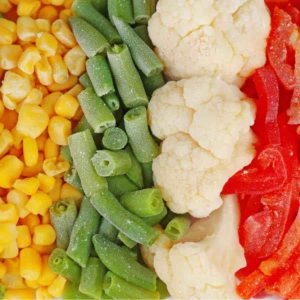
Not sure if frozen vegetables are okay for your family’s diet? Read on to get the simple answers you’ve been looking for.
This is part one of our myth buster series, and yes, frozen produce is a healthy choice for good nutrition! Sure, fresh, crisp vegetables are delicious. There’s nothing better than crunchy bell peppers, crispy carrots, or a bite of refreshing jicama on a summer day. But we all have those weeks when we can’t make it to the store to restock the fridge. The fresh produce you bought last week starts to brown, and you’ve used up all the meat or chicken. This is when turning to the pantry or freezer can be a complete lifesaver!
Believe it or not, your pantry and freezer can hold all of the ingredients you need for easy weeknight meals. So let’s debunk some common myths surrounding frozen and packaged foods and look at easy and healthy ways to use them in your weekly meal rotation!
Nutrition Myth:
Frozen fruits and vegetables aren’t as good as fresh.
Nutrition Myth Busted:
Frozen fruits and vegetables can be as good as (or better than!) their fresh counterparts.
The nutrition quality is there!
Frozen fruits and vegetables are often flash frozen as soon as they’re harvested. Since they’re picked during peak season and frozen immediately, frozen produce items can be even more nutritious than some fresh produce! Of course, fresh foods can have superior taste when enjoyed raw, but cooked frozen veggies can be full of flavor too. Many out-of-season fruits and veggies are grown miles away (or in a foreign country) and then shipped in trucks to your local grocery store. The food may be days or even weeks old by the time it hits your fridge. The longer the food sits, either during transport or on the shelf in the grocery store, the more nutrients it loses. So if you aren’t getting the benefits of local produce, and instead typically buy produce that is not in season, frozen may actually be the best choice.
They help reduce food waste!
Fresh fruits and veggies can often be forgotten and left to rot in the back of the fridge, despite your best intentions when purchasing them. The good news is that with frozen foods, this is one of your last worries. Just be careful not to over-stock your freezer—you don’t want to eat freezer-burned vegetables. Rotate your food, so the older purchases are moved to the front of your freezer to be used first. Pro tip: Freeze leftover fruits that are over ripe or browning and use them in smoothies, also great for conservation!
They’re time and money savers!
Buying frozen produce means that you are buying pre-cut ingredients that are ready to toss into whatever meal you decided to make. Not only do you save time with cutting and preparing everything, but you’ll also spend less time on cleaning duty. The added bonus is that frozen fruits and vegetables are often cheaper than the fresh versions!
They rescue you when you didn’t plan ahead!
With busy schedules and many children to feed, sometimes your brain goes on vacation at the grocery store and you forget key produce for the dishes you planned to make. If you have bags of frozen items like spinach, broccoli, cauliflower, or mixed veggies, you’ll take off a load of stress and can substitute those veggies for the original item you planned to use. One of my favorites is frozen spinach, which can be defrosted and mixed in with other staples, like breadcrumbs and Parmesan cheese, to create tasty (plus healthy and cheap) spinach balls.
Now that you’re ready to give frozen produce a try, just make sure to check the ingredient list. When selecting frozen items, choose veggies without sauces and fruit without added sugar or juices. The ingredients list should only contain the vegetables or fruit that you’re buying. Plain frozen fruit makes for excellent smoothies when blended with a banana and milk. Defrost, cook, and eat frozen veggies plain, purée them in soups, or toss them in a pasta sauce. Now it’s finally time for you to get creative – raid that freezer, dig deep and rescue your produce from impending freezer burn!









